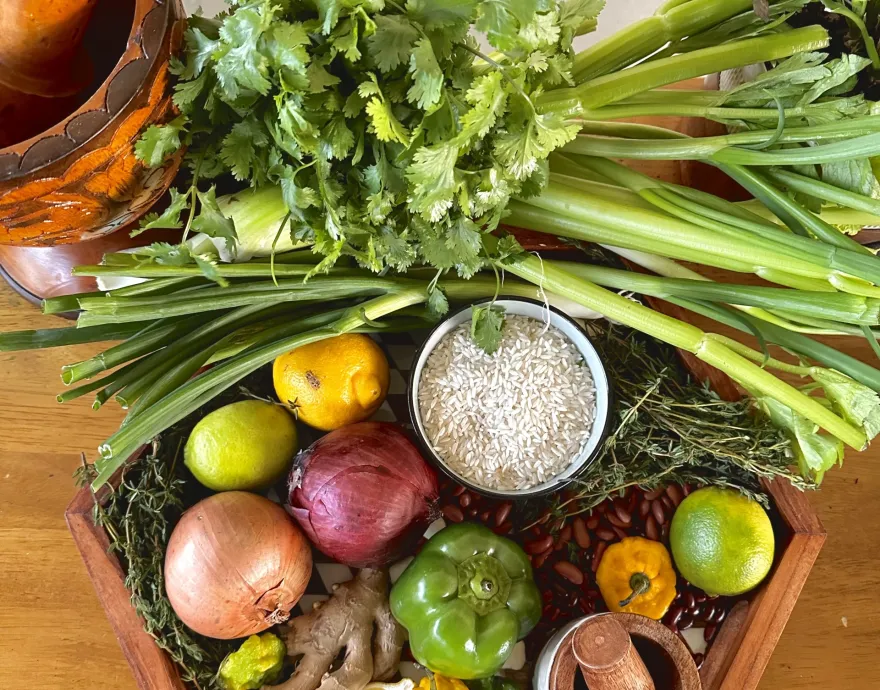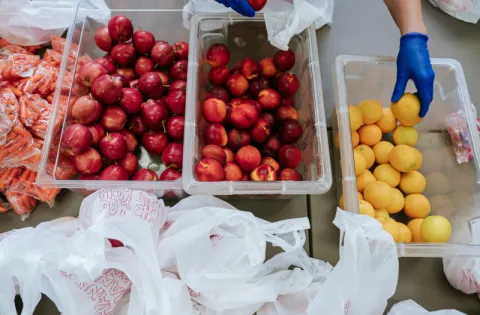Nayshma Jones works as the program manager for the No Kid Hungry campaign in Florida. She is passionate about bringing real solutions to the members of her community. Her experiences as a teacher, non-profit program manager, director of communications, student of psychology and woman of color has led her to champion societal inequities such as environmentalism, health, education, women empowerment and civic participation. Now working to address nutrition and food accessibility with No Kid Hungry in Florida, she shares her reflections on Black History Month and the 2024 theme of Joy.

As we draw our hearts to the theme of Black Joy for this year’s annual celebration of Black History Month, one of the many things that brings me joy is cooking. The process of it, the community of it, the learning and of course the results.
Moving into my new apartment in the heart of South Florida, the multiculturalism on display in my kitchen brings my attention to the Black diaspora that resides within me. My mother, a woman of thought and action, from the lush tropics of Jamaica and my father, an iron clad man from the Deep South of Mississippi. There were times in my growing up that I couldn’t imagine any two cultures being more opposed. Thankful for learning and wisdom, I now relish the overwhelming number of similarities that they share between one another. Historically, that connection is drawn from a peculiar triangle, a geometric trade of raw materials, produce, money and people.
In fact, millions of people, forcibly enslaved and transported in the most inhumane methods from the West Coast of Africa, landing at port of calls like Port Royal, Port-Au-Prince, Port of Spain to the coalesce into the Port of New Orleans, Ports of St. Augustine and the Natchez in Mississippi. Although separated, we’ve managed to subconsciously remain united. This is evidenced in the familiarity of our traditions, languages, mannerisms and arguably most prevalent in our foods.
In The South, particularly New Orleans, where I’ve had the pleasure of living, Mondays could not pass without red beans and rice, a staple and hearty dish made to fuel us throughout the workday. On Saturdays, red pea soup is enjoyed even on our hottest days in Jamaica. Which serves as a foundation for stew peas and rice on Wednesdays, that has no doubt a close relationship to red beans and rice.

The holy trinity of Creole cooking is celery, bell pepper and onion. While in the Caribbean thyme, scallion, and scotch bonnet pepper. Whether that is in the form of green seasoning, epis, or sofrito.
I remember days of going to school and not wanting to participate in breakfast or lunch, opting for the safest option, salad. Pizza, and chicken nuggets did not appeal to my Black Caribbean-American palate.
I am fortunate that in my work with the No Kid Hungry campaign, I have been able to witness and support communities throughout the nation that are taking the time to garner student feedback on the types of meals they desire to see at their school.
Now, I get to embody joy while working with an organization that intentionally labours towards closing nutritional gaps for students across the state and the nation. Three distinct phases of my life make this impactful as I reflect. First, as a little girl, I struggled to find culturally familiar food options and often went hungry until I returned home to my grandmother’s kitchen. Then, as a teacher, I educated and cared for students who struggled with food insecurity. Now, as a non-profit program manager, I employ knowledge of culture, history, health equity and community engagement to bring real results to my community. My work has come full circle just as a large ladle stirs the pot.
In Florida, where I work and play, the beauty and breadth of the Black community is always on full display. Afro-Caribbeans, Afro-Latinos, Afro-Indigenous, Africans and the African Americans born and raised in the great State of Florida are at the heart of this community. The intersections of Blackness continue to expand calling for organizations, industries, and institutions to take pause, to fully study and appreciate the true diversity of blackness.
We are grateful for our community partners, school districts and boards that are doing the tedious work of researching these important cultural differences and similarities. To piece together the puzzle of what true cultural intelligence, sensitivity and inclusivity looks like in our communities, classrooms, and school menus. No Kid Hungry eagerly awaits the opportunity to support you and your efforts in creating environments and dishes that speak to the souls and hearts of your students.
Learn more about this work on this website. Stay tuned for more stories about Black joy from our staff and the communities working to end childhood hunger.


